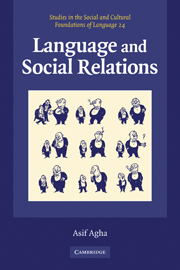Book contents
- Frontmatter
- Contents
- List of figures
- List of tables
- Acknowledgments
- Typographical conventions
- Introduction
- 1 Reflexivity
- 2 From referring to registers
- 3 Register formations
- 4 The social life of cultural value
- 5 Regrouping identity
- 6 Registers of person deixis
- 7 Honorific registers
- 8 Norm and trope in kinship behavior
- Notes
- References
- Index
- STUDIES IN THE SOCIAL AND CULTURAL FOUNDATIONS OF LANGUAGE
2 - From referring to registers
Published online by Cambridge University Press: 05 September 2012
- Frontmatter
- Contents
- List of figures
- List of tables
- Acknowledgments
- Typographical conventions
- Introduction
- 1 Reflexivity
- 2 From referring to registers
- 3 Register formations
- 4 The social life of cultural value
- 5 Regrouping identity
- 6 Registers of person deixis
- 7 Honorific registers
- 8 Norm and trope in kinship behavior
- Notes
- References
- Index
- STUDIES IN THE SOCIAL AND CULTURAL FOUNDATIONS OF LANGUAGE
Summary
Introduction
The purpose of this chapter is to show that everyday acts of referring to things in the world are organized by underlying principles that mediate social relations among speech participants. Referring is an unavoidably ‘social’ act. Indeed, by the end of the chapter we will see that referring is a social act in several distinct senses of the term ‘social.’ These require distinct kinds of analysis. In a highly ubiquitous type of case, ordinary acts of referring establish social relations among current speech participants (speakers and hearers of referential utterances) but the forms used to achieve such effects are not widely recognized or discussed out of context as social indexicals at all; here referential usages map out precise distinctions of role and relationship but are not assigned stereotypic social indexical values. In sharp contrast are cases where denotational variants that are usable for referring are widely recognized as belonging to pragmatically distinct registers of a language. In the latter half of the chapter I show that such registers are themselves based on a reanalysis of variation in denotational practices within a community; here the more generalized social functions of referring are re-evaluated to yield the very special case where denotational variants become stereotypically valued as indexicals of speaker's role or relationship to others.
The initial sections of this chapter offer an account of referring as a mode of social semiosis.
- Type
- Chapter
- Information
- Language and Social Relations , pp. 84 - 144Publisher: Cambridge University PressPrint publication year: 2006



